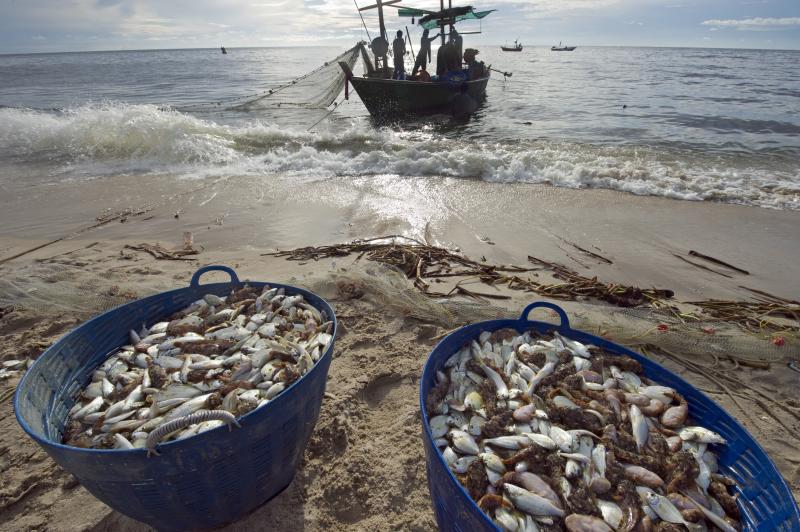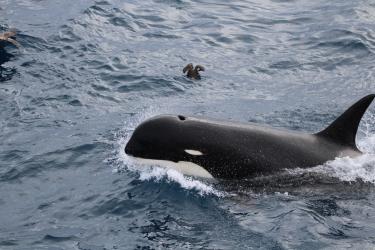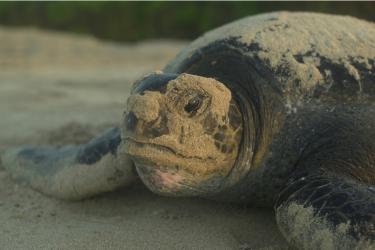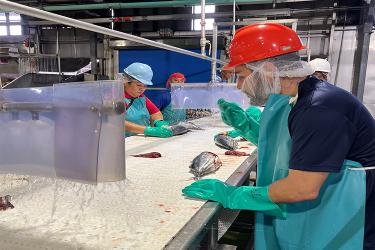Nearly 100 representatives from across government and the seafood industry kicked off a new public-private initiative to fight labor issues in the seafood supply chain. The initiative, Collaborative Accelerator for Lawful Maritime Conditions in Seafood, is also called CALM-CS (pronounced “calm seas”). It will help participants work together to promote legal and safe working conditions, and develop and execute comprehensive approaches to fight labor abuses in the fishing and seafood industry.
Illegal and inhumane working conditions in the seafood sector devastate victims and their families. They destabilize maritime security and supply chains, and degrade fishery resources and broader marine ecosystems. Left unchecked, labor abuses undermine U.S. economic competitiveness, national security, fishery sustainability, and the livelihoods and human rights of fishers around the world.
In the face of a wrong so pervasive, none of us can succeed alone. The fight to end these practices demands broad cooperation. That’s why the initiative engages with companies and stakeholders who share our commitment. CALM-CS is chaired by Alexa Cole, Director of NOAA Fisheries' Office of International Affairs, Trade, and Commerce. Vice chairs are Steve Trent, Environment Justice Foundation, and John Connelly, National Fisheries Institute. CALM-CS is not an advisory body and will not make recommendations to government agencies or for government actions.
CALM-CS aims to produce tangible results in this fight. Its efforts are focused around 5 work streams—each to be executed over the next 15 months:
- Identifying best practices for industry accountability and due diligence for decent working conditions throughout the seafood supply chain
- Exploring novel sources of information, and enhancing means to share and analyze that information, to better identify illegal and unsafe labor practices in fisheries
- Leveraging technology and supporting relevant organizations to reduce vulnerabilities of crew and observers to labor abuses at sea
- Exploring potential tools to enhance safety and labor conditions aboard U.S. vessels
- Supporting collaboration mechanisms across workers, governments, industry, and civil society to support workers within the seafood industry, including their ability to organize, and to access remediation and justice
Working Group Participants
Representatives from all relevant sectors—workers, harvesters, processors, retailers, brokers, NGOs, and think tanks—participated in the October 6 kick off meeting. Each bringing their insight, experience and resolve to this issue.
At the launch, leaders from all five of the initiative’s working groups presented their objectives and potential activities to the larger group. Working group leadership includes one representative from the private sector and one from the U.S. government.
Standards/Due Diligence
Chair: Sara Lewis, Fishwise
Data/Information to Identify Illegal Labor Practices
Co-Chairs: Marti Flacks, Center for Strategic and International Studies and Erika Carlsen, NOAA
Tools to Support At-Risk Populations At Sea
Co-Chairs: Lisa Rende Taylor, Issara Institute and Laura VanVoorhees, U.S. Department of Labor
Potential tools to Enhance Safety and Labor Conditions Aboard U.S. Vessels
Co-Chairs: Matt Tinning, At-Sea Processors Association, and Elizabethann Mencher, NOAA
Workers Voice
Co-Chairs: JJ Rosenbaum, Global Labor Justice, and Marina Colby, U.S. Agency for International Development
Moving Forward
Civil society and government have a shared role in preventing illegal and harmful labor practices in the seafood supply chain, as well as promoting legal, safe, and healthy working conditions for workers in the fishing industry. The CALM-CS initiative leverages the urgency we all feel toward these issues to engage collaborators with a results-driven focus.



